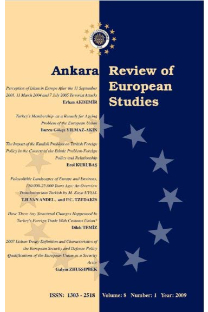BREXIT VE MALİ HİZMETLER
Brexit’in gerçekleşmesi Avrupa Birliği (AB) ve Birleşik Krallık (BK) arasındaki mali hizmetleri önemli ölçüde etkileyecektir. Bu etki Londra’nın Dünyanın küresel finans merkezi olmasından ve AB-BK ilişkilerinin dayandığı mevcut pasaport rejiminin sona erecek olmasından kaynaklanmaktadır. Geçiş döneminde AB’nin Kanada tarzı ve mali hizmetleri de kapsayan bir Serbest Ticaret Anlaşması (STA) yapması söz konusu olabilir. Ya da BK ile AB arasında karşılıklı ekonomik ilişkileri düzenleyen başka bir model de söz konusu olabilir. Aksi takdirde geçiş döneminin sona ermesi ile beraber BK üçüncü ülke konumuna gelecektir. Böylece AB ve BK arasında mali hizmetler ticareti Dünya Ticaret Örgütü’nün (DTÖ) Hizmetler Ticareti Genel Anlaşması (GATS) kuralları çerçevesinde yapılabilecektir. Bu da mali firmaların Londra’dan AB-27’e göç etmelerine sebebiyet verecektir ve halihazırda bu süreç başlamıştır. Bu durumda BK firmaları belirli mali hizmet alanlarında AB üçüncü ülke denklik rejimine tabii olabilecektir. Üçüncü ülke Denklik rejimi BK merkezli mali kurumlar için AB Tek Pazarına erişimin ciddi anlamda sınırlanacağı anlamına gelmektedir. Bu durumdan en çok etkilenecek mali hizmetler başta bankacılık olmak üzere, sırasıyla piyasa altyapısı, aktif yönetimi ve sigorta ile reasürans olacaktır. Brexit, finansal piyasalarda parçalanmışlığı da beraberinde getirecektir. Londra’nın finans merkezi olarak yerinin kısa sürede değişmeyeceği kabul edilmekle beraber dört önemli şehir AB 27 toptan piyasalarına ev sahipliği yapacak gibi görünmektedir. Bu şehirler Frankfurt, Paris, Dublin ve Amsterdam’dır.
Brexit and Financial Services
The realization of Brexit will significantly affect the financial services between the European Union (EU) and the United Kingdom (UK). This effect is due to the fact that London is the global financial center of the world and the current passport regime on which EU-UK relations are based will end. During the transition period, it may be possible for the EU to make a Canadian type Free Trade Agreement (FTA) that includes financial services. Or it could be another model that regulates bilateral economic relations between the UK and the EU. Otherwise, once the transition period ends, the UK will become a third country. Thus, financial services trade between the EU and the UK will be handled within the framework of the rules of the World Trade Organization (WTO) General Agreement on Services Trade (GATS). This will cause financial firms to migrate from London to the EU-27 and this process has already started. For certain financial services, UK companies may then be subject to the EU third country Equivalence regime. The third country Equivalence regime means that for UK-based financial institutions access to the EU Single Market will be severely restricted. Financial services that will be most affected will be banking, market infrastructure, asset management, insurance and reinsurance, respectively. Brexit will also bring fragmentation in financial markets. Although it is accepted that London's place as a financial center will not change in a short period of time, it seems that four important cities will host the EU 27 wholesale markets. These cities are Frankfurt, Paris, Dublin and Amsterdam
___
- Armour, J. “Brexit and Financial Services”, Oxford Review of Economic Policy 33, Number S1, 2017.
- Batsaikhan, U, Kalcik, R. Schoenmaker, D. “Brexit and the European Financial System: mapping markets, players and jobs”, Bruegel Policy Contribution, No 2017/4, Bruegel, Brussels. BDO, “Brexit and Financial Services”, November 2017.
- CDI ve ZYen “The Global Financial Centres Index 23”, 2018, www.longfinance.net/Publications/GFC23.pdf
- Directorate-General for Internal Policies Policy Department A, “Implications of Brexit on EU Financial Services”, June 2017.
- Djankov, S. “The City of London after Brexit”, Peterson Institute for International Economics, Şubat 2017.
- Ferran, E. “The UK as a Third Country Actor in EU Financial Services Regulation”, Journal of Financial Regulation, 3, 2017.
- Financial Times 25 Haziran 2019.
- HM Government. “The Future Relationship between the UK and the EU”, White Paper, 2018.
- Hohlmeier M. ve Fahrholz, C. “The Impact of Brexit on Financial Markets-Taking Stock”, International Journal of Financial Studies, 6(65), 2018.
- Howarth D. and Quaglia, L. “Brexit and the Single European Financial Market”, Journal of Common Market Studies Volume 55, Annual Review, 2017.
- Lannoo, K. “EU Financial Market Access after Brexit”, Intereconomics, Leibniz Information Centre for Economics, 2016.
- Lanoo, K. “ EU-UK Financial Market Access in 2021”, 2020, CEPS.
- McMahon, M. “The Implications of Brexit for the City” The CAGE Background Briefing Series No:80 September 2017.
- Moloney, N. “Brexit and Financial Services:(yet) another re-ordering of institutional governance for the EU financial system?” Common Market Law Review55(3), 2018.
- Quaglia, L. “European Union Financial Regulation, Banking Union, Capital Markets Union and the UK”, SPERI Paper No:38, 2017.
- Reply Avantage. “BREXIT: The Impact of Brexit on Financial Institutions”, 2018.
- Ringe, W-G. “The Irrelevance of Brexit fort he European Financial Market”, University of Oxford Legal Research Paper Series Paper No: 10:2017, 2018.
- Sapir, A., Schoenmaker, D., Véron,N. “Making the Best of Brexit fort he EU 27 Financial System”, Policy Brief, Issue 1, February 2017.
- Schoenmaker, D. “The UK Financial Sector and EU Integration after Brexit: The Issue of Passporting”, 2016.
- Kavaljit, S. “The Future of Financial Services after Brexit: Options and Limitations”, Briefing Paper no:22, 2018.
- Wyman, O. “The Impact of the UK’s Exit from the EU on the UK-based Financial Services Sector”, Ekim 2016, www.oliverwyman.com/content/dam/oliver-wyman/global/en/2016/oct/Brexit_POV.PDF
- ISSN: 1303-2518
- Yayın Aralığı: Yılda 2 Sayı
- Başlangıç: 2001
- Yayıncı: Ankara Üniversitesi Avrupa Toplulukları Araştırma ve Uygulama Merkezi
Sayıdaki Diğer Makaleler
BREXİT’İN BİRLEŞİK KRALLIK SİYASAL SİSTEMİ İLE ETKİLEŞİMİ
BREXIT: AB KURUMLARINA, POLİTİKA YAPIM VE KARAR SÜREÇLERİNE ETKİSİ
Brexit’in AB’nin Dünyadaki Güvenlik ve Savunma Aktörlüğüne Etkileri
BREXIT: EKONOMİK ÇÖZÜLME VEYA YENİDEN DİRİLİŞİN İLK ADIMI
HUKUKİ VE UYGULAMADAKİ BOYUTUYLA AVRUPA BİRLİĞİ’NDEN ÇEKİLME
BREXIT VE AVRUPA’DA POPÜLİST RADİKAL SAĞIN YÜKSELİŞİ
Özgehan ŞENYUVA, Ebru Ece ÖZBEY
BREXIT’İN AVRUPA BİRLİĞİ’NİN GENİŞLEME POLİTİKASI VE AVRUPA KOMŞULUK POLİTİKASI’NA ETKİLERİ
“AB Hukuku Kısıtları Işığında Brexit Sonrası AB-Birleşik Krallık İlişkileri İçin Olası Model(ler)”
